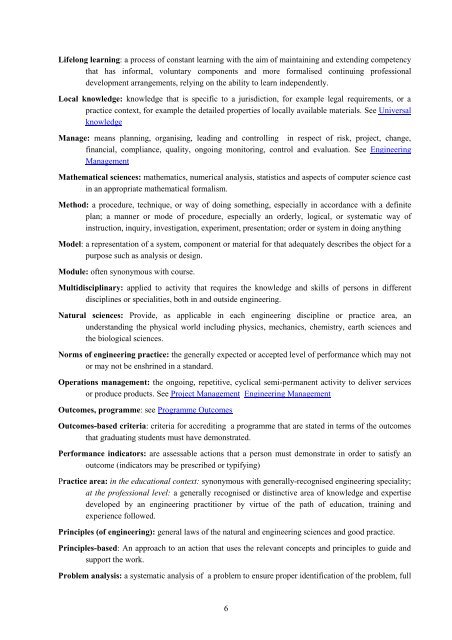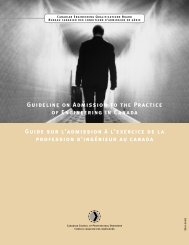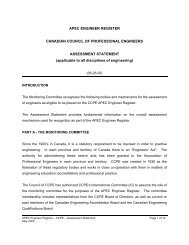Glossary of Terms (pdf) - Washington Accord
Glossary of Terms (pdf) - Washington Accord
Glossary of Terms (pdf) - Washington Accord
You also want an ePaper? Increase the reach of your titles
YUMPU automatically turns print PDFs into web optimized ePapers that Google loves.
Lifelong learning: a process <strong>of</strong> constant learning with the aim <strong>of</strong> maintaining and extending competency<br />
that has informal, voluntary components and more formalised continuing pr<strong>of</strong>essional<br />
development arrangements, relying on the ability to learn independently.<br />
Local knowledge: knowledge that is specific to a jurisdiction, for example legal requirements, or a<br />
practice context, for example the detailed properties <strong>of</strong> locally available materials. See Universal<br />
knowledge<br />
Manage: means planning, organising, leading and controlling in respect <strong>of</strong> risk, project, change,<br />
financial, compliance, quality, ongoing monitoring, control and evaluation. See Engineering<br />
Management<br />
Mathematical sciences: mathematics, numerical analysis, statistics and aspects <strong>of</strong> computer science cast<br />
in an appropriate mathematical formalism.<br />
Method: a procedure, technique, or way <strong>of</strong> doing something, especially in accordance with a definite<br />
plan; a manner or mode <strong>of</strong> procedure, especially an orderly, logical, or systematic way <strong>of</strong><br />
instruction, inquiry, investigation, experiment, presentation; order or system in doing anything<br />
Model: a representation <strong>of</strong> a system, component or material for that adequately describes the object for a<br />
purpose such as analysis or design.<br />
Module: <strong>of</strong>ten synonymous with course.<br />
Multidisciplinary: applied to activity that requires the knowledge and skills <strong>of</strong> persons in different<br />
disciplines or specialities, both in and outside engineering.<br />
Natural sciences: Provide, as applicable in each engineering discipline or practice area, an<br />
understanding the physical world including physics, mechanics, chemistry, earth sciences and<br />
the biological sciences.<br />
Norms <strong>of</strong> engineering practice: the generally expected or accepted level <strong>of</strong> performance which may not<br />
or may not be enshrined in a standard.<br />
Operations management: the ongoing, repetitive, cyclical semi-permanent activity to deliver services<br />
or produce products. See Project Management Engineering Management<br />
Outcomes, programme: see Programme Outcomes<br />
Outcomes-based criteria: criteria for accrediting a programme that are stated in terms <strong>of</strong> the outcomes<br />
that graduating students must have demonstrated.<br />
Performance indicators: are assessable actions that a person must demonstrate in order to satisfy an<br />
outcome (indicators may be prescribed or typifying)<br />
Practice area: in the educational context: synonymous with generally-recognised engineering speciality;<br />
at the pr<strong>of</strong>essional level: a generally recognised or distinctive area <strong>of</strong> knowledge and expertise<br />
developed by an engineering practitioner by virtue <strong>of</strong> the path <strong>of</strong> education, training and<br />
experience followed.<br />
Principles (<strong>of</strong> engineering): general laws <strong>of</strong> the natural and engineering sciences and good practice.<br />
Principles-based: An approach to an action that uses the relevant concepts and principles to guide and<br />
support the work.<br />
Problem analysis: a systematic analysis <strong>of</strong> a problem to ensure proper identification <strong>of</strong> the problem, full<br />
6




